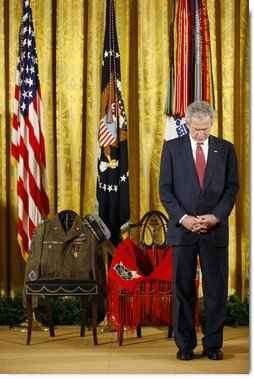It's taken nearly 60 years for Master Sergeant Woodrow Wilson Keeble to become the first Sioux-American to be awarded the Medal of Honor, the nations highest, for heroic actions on the battlefield in Korea.
"A terrible injustice was done to a good man, to his family, and to history. And today we're going to try to set things right," said the president who awarded the medal posthumously to Keeble's son.
(President George W. Bush bows his head during a prayer Monday, March 3, 2008 in the East Room of the White House, standing before two chairs in honor of U.S. Army Master Sgt. Woodrow Wilson Keeble, left, and his wife, Bloosom, moments before presenting members of the Keeble family with the Medal of Honor, posthumously, in honor of Keeble's gallantry during his service in the Korean War. Keeble is the first full-blooded Sioux Indian to receive the Medal of Honor. – WH photo by Eric Draper)
"On behalf of our grateful nation, I deeply regret that this tribute comes decades too late. Woody will never hold this medal in his hands or wear it on his uniform. He will never hear a president thank him for his heroism. He will never stand here to see the pride of his friends and loved ones, as I see in their eyes now."
Woody Keeble was already a decorated veteran of Guadalcanal in WWII, but volunteered to serve his country a second time. "Woody said he volunteered for Korea because, "somebody has to teach those kids how to fight," Bush told the gathering of officials, family, friends. "He quickly became a mentor, a teacher, and a legend. He was so strong that he could lift the back of a jeep and spin it around."
The heroism on the battlefield which earned him the Medal of Honor took place on October 20, 1951. U.S. forces were under attack by a furious assault. "One soldier said the enemy lobbed so many grenades on American troops that they looked like a flock of blackbirds in the sky. Allied forces had tried heavy artillery to dislodge the enemy, and nothing seemed to be working. The offensive was failing. American boys were dying." But they had one advantage — his name was Woody.
"Soldiers watched in awe as Woody single-handedly took out one machine gun nest, and then another," Bush said. "When Woody was through, all 16 enemy soldiers were dead, the hill was taken, and the Allies won the day."
Even at this late date there is a way for Americans to show their gratitude.
"We can tell his story. We can honor his memory" Bush insisted. "And we can follow his lead, by showing all those who have followed him on the battlefield the same love and generosity of spirit that Woody showed his country every day."
Though decades went by while family members and friends worked to steer the paperwork through a beauracracy that could give the recognition he deserved, and though the paperwork was lost more than once, Bush said Woody never complained. "See, he believed America was the greatest nation on earth — even when it made mistakes."
(NBC News)










Be the first to comment